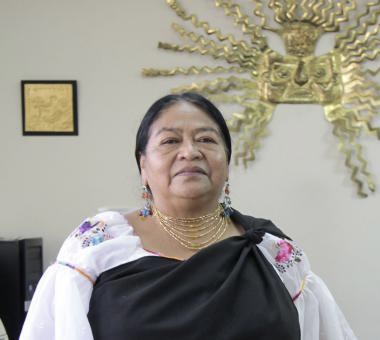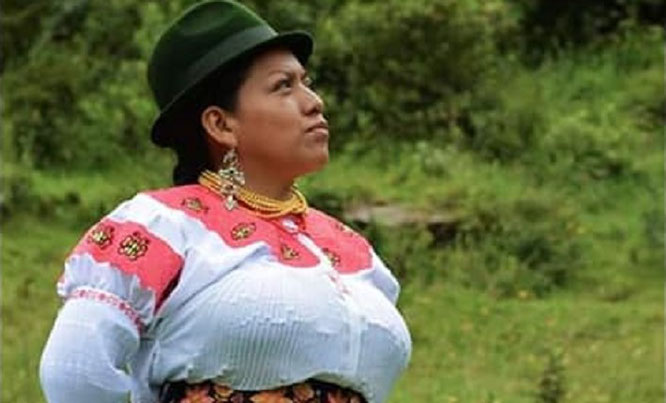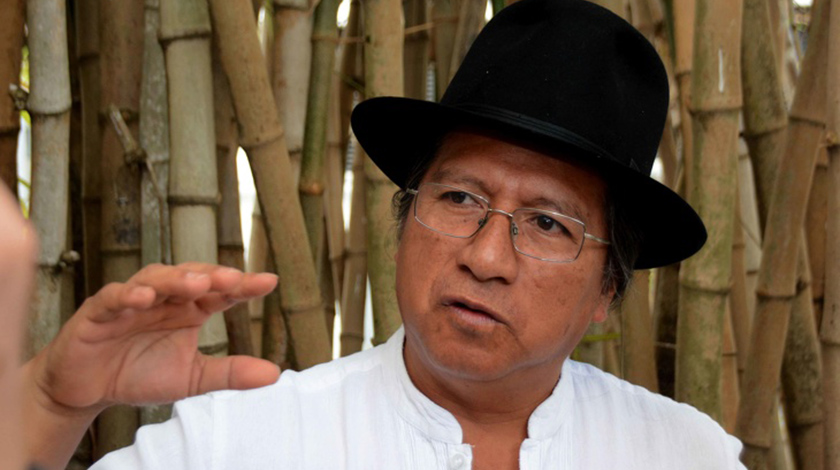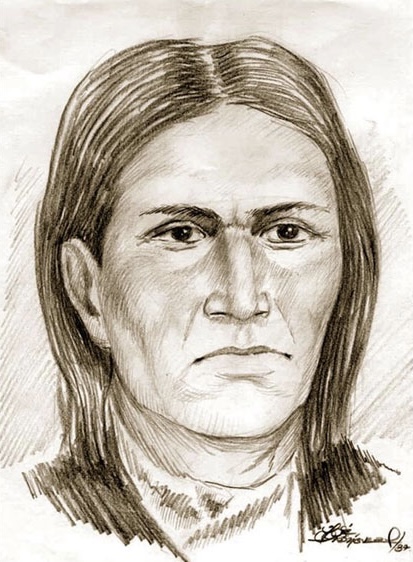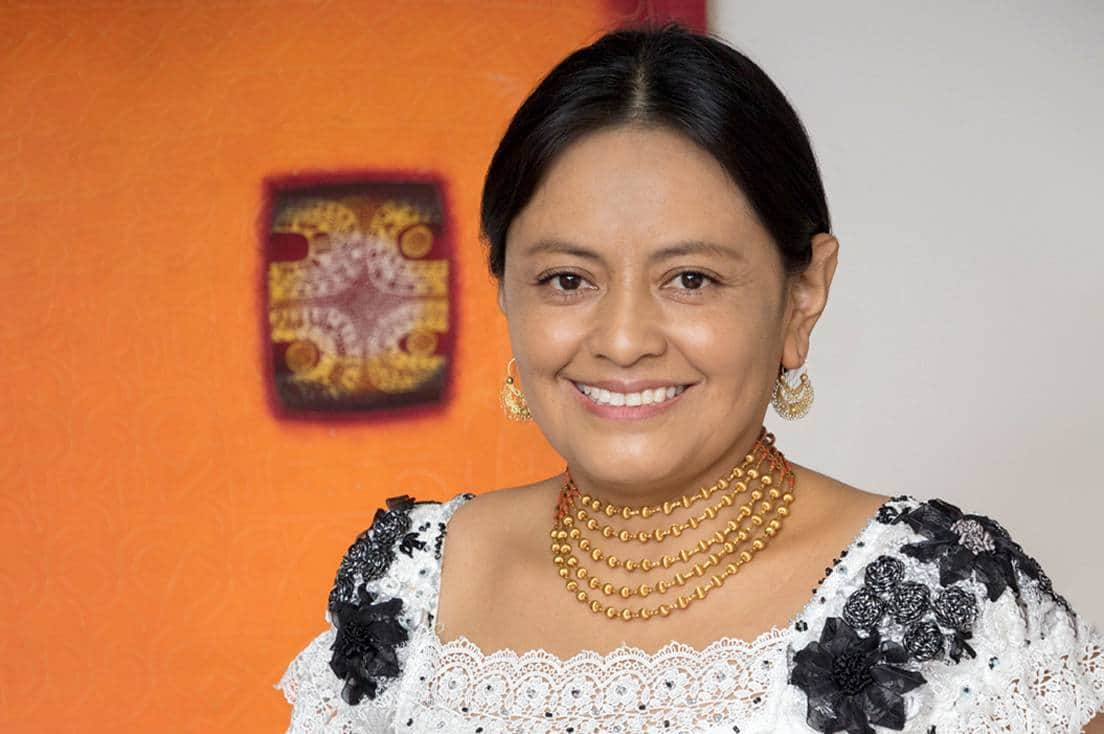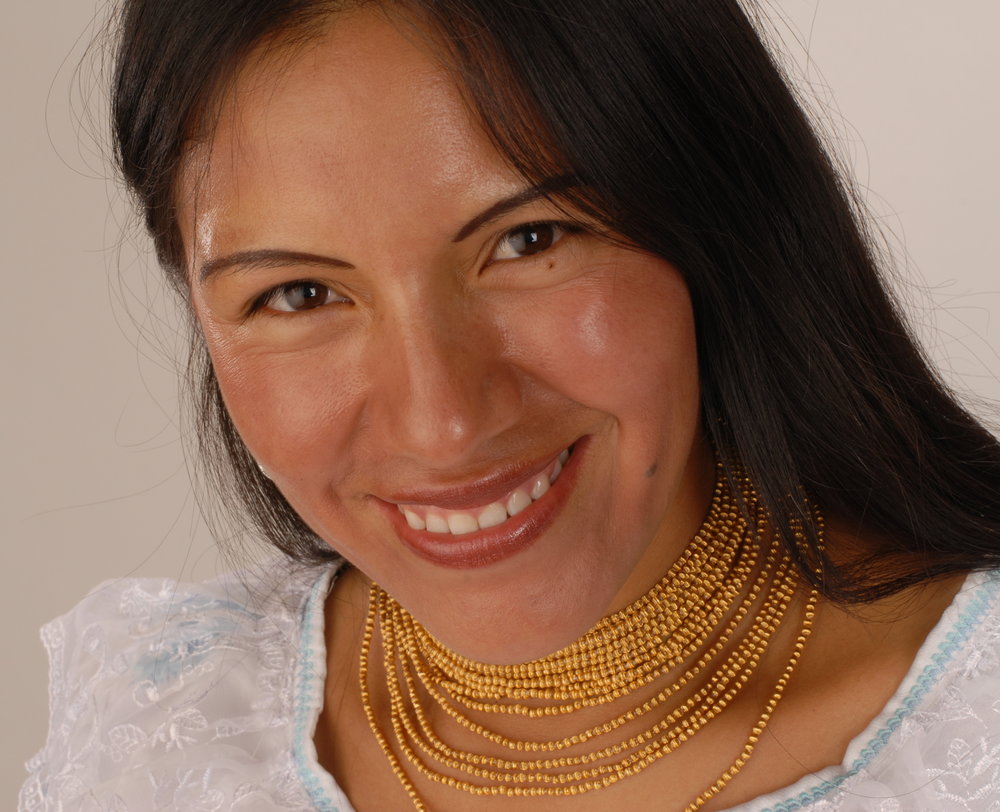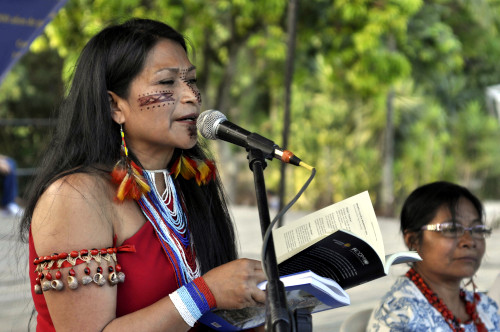Estelina Quinatoa Cotacachi (Riobamba, October 1, 1953) is a distinguished Ecuadorian historian and curator of Kichwa Otavalo heritage. Her extensive qualifications include a Bachelor’s in Applied Anthropology from the Salesian Polytechnic University, a Master’s in Conservation and Cultural Asset Management from Universidad SEK, and the title of Anthropology expert from Universidad Abierta de Loja. She has contributed significantly as an Educational Guide at the Museum and Galleries of the Central Bank of Ecuador and later as an Assistant at the Archaeological Reserve of the Central Bank of Ecuador. Internationally acclaimed, she has conducted courses and conferences across the Americas and Europe. Her prolific publications and research reflect her unwavering commitment to preserving Ecuador’s cultural heritage, culminating in her prestigious induction into the National Academy of History of Ecuador in June 2021.
Continue reading “Estelina Quinatoa Cotacachi”Category: Indigenous writers
Gladys Potosí Chuquín
Gladys Potosí Chuquín (Angochagua, Imbabura, February 17, 1981) is an Ecuadorian poet and activist who is a member of the Kichwa-Karanki indigenous community. Like the Otavalo, the Natabuela, and the Puruhá, the Karanki are a pre-Inca tribe who adopted the Kichwa language (Quechua) as a result of Incan influence. However, the Iberian invasion that followed the Inca one eventually imposed Spanish as the main language in the Andean area where she is from. She stopped writing in Spanish so that she could find her voice in Kichwa (Quechua), and her poetry serves as a witness to or reflection of the changes that have occurred among her people and herself. She has represented Ecuador at various literature festivals in and outside of Ecuador.
Continue reading “Gladys Potosí Chuquín”Ariruma Kowii
Ariruma Kowii, born Jacinto Conejo Maldonado (Otavalo, Imbabura, Ecuador, August 4, 1961) is considered one of the most important poets writing in the Quechua language. His debut poetry collection Mutsuctsurini (1988) was one of the first books to be written and published exclusively in Quechua. He is also a columist for the Quito newspaper Hoy. In 2007 he was appointed Undersecretary of Education for the Indigenous Peoples of Ecuador in the Ministry of Education, responsible for Intercultural Dialogue. He teaches Literature and Cultural Studies at the Simón Bolívar Andean University. He is the brother of the mayor of Otavalo, Mario Conejo Maldonado.
Continue reading “Ariruma Kowii”Jacinto Collahuazo
Jacinto Collahuazo (Otavalo, 1665 – 17??) was a cacique (indigenous political leader) from Otavalo, Ecuador. He was a poet and historian who was imprisoned by the Spanish for having written a book in Quechua related to the war between Huáscar and Atahualpa titled, “History of the civil wars of Atahualpa and his brother Atoco, known commonly as Huascar Inca.” His work was burned publicly by the Magistrate of Ibarra and he was sentenced to jail, where he spent his last days. He is considered the first Ecuadorian indigenous chronicler. He lived past 80 but his exact date of death is unknown.
Continue reading “Jacinto Collahuazo”Yana Lema
Yana Lema, full name Yana Lucila Lema Otavalo (Peguche, Otavalo canton, Ecuador, 1974) is an Ecuadorian journalist, writer, poet, translator, cultural promoter, and college professor. She writes in Spanish and Quechua. For more than seven years, she worked as a presenter on the RTS Kichwapi newscast and later on Ecuador TV’s Willaykuna newscast. In 2016, she published her story “Chaska” in Quechua and Spanish, and in 2019, her collection of poems “Tamyawan Shamukupani.” Lema has participated in fairs and literary festivals in Quito, La Paz, Havana, Guadalajara, Guayaquil, Medellín, Bogotá, Mexico, and Genoa. In 2021, her poetry book “Tengo hambre de tu boca” won the Jorge Carrera Andrade Prize. She resides in Guayaquil and serves as a professor at the University of the Arts, where she teaches Oral and Latin American Literature.
Continue reading “Yana Lema”Maria Virginia Farinango
Maria Virginia Farinango (Otavalo, Ecuador) was born in an Indigenous Quichua community near Otavalo, Ecuador. In 2011, she and Laura Resau co-authored the novel The Queen of Water, based on the true story of her girlhood. After many years of running her own Andean crafts business and traveling extensively with her husband, Tino, an Andean musician, Maria Virginia earned a master’s degree in psychology. Maria Virginia now resides in Otavalo with her husband, son, and daughter, where she practices clinical psychology.
Continue reading “Maria Virginia Farinango”María Clara Sharupi Jua
María Clara Sharupi Jua (Morona Santiago, 1964) is an Ecuadorian writer, poet, and translator, who writes in Spanish and Shuar, an indigenous language of Ecuador’s Amazon basin. She writes poetry in Shuar, while translating it into Spanish in order to reach a wider audience. She co-wrote the book “Amanece en nuestras vidas” (2011), the first anthology of poetry from Ecuadorian indigeneous women writers, and wrote the short story collection “Tarimiat” (2019), which was written in Shuar, Spanish, and English. Sharupi Jua also works as a translator and radio and television presenter in Shuar and Spanish. She was a member of the translation team that worked on the official Shuar translation of Ecuador’s Constitution. She lives in Quito, where she has also worked for the Ministry of Foreign Affairs and Migration on indigenous issues.
Continue reading “María Clara Sharupi Jua”
